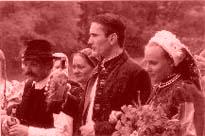 |
 |
 |
 |
 |
 |
 |
 |
 |
 |
"Ne hagyd elveszni Erdélyt Istenünk!"
S én nem tudom a sorsot, mit tartogat még ezutánra, E végzetes ég alatt lesz-e még öröm? De tudok annyit, hogy ha öröm helyett Tüzes mennykövek szakadnak is itt le, - Míg gyászosan évek százai húznak el - Õk örömtelenül is, ha bajba tébolyodottan: Itt fognak állni örökké, - hogy Imre szorítja, Áron pedig ... Áron nem hagyja magát! Lófürösztés, Tompa László Rise up, Magyar, the country calls! It's 'now or never' what fate befalls... Shall we live as slaves or free men? That's question - choose your 'Amen'! God of Hungarians, we swear unto Thee, We swear unto Thee - that slaves we shall no longer be! For up till now we lived like slaves, Damned lie our forefathers in their graves - They who lived and died in freedom Cannot rest in dusts of thraldom. God of Hungarians, we swear unto Thee, We swear unto Thee - that slaves we shall no longer be! A coward and a lowly bastard Is he, who dares not raise the standard - He, whose wretched life is dearer Than the country's sacred honor. God of Hungarians, we swear unto Thee, We swear unto Thee - that slaves we shall no longer be! Sabers outshine chains and fetters, It's the sword one's arm betters. Yet we wear grim chains and shackles. Swords, slash through the damned manacles! God of Hungarians, we swear unto Thee, We swear unto Thee - that slaves we shall no longer be! Magyars' name will tell the story Worthy of our erstwhile glory: We must wash off - fiercely cleansing Centuries of shame condensing. God of Hungarians, we swear unto Thee, We swear unto Thee - that slaves we shall no longer be! Where our grave-mounds bulge and huddle Our grandsons will kneel and cuddle, while in grateful prayer they mention All our sainted names' ascension. God of Hungarians, we swear unto Thee, We swear unto Thee - that slaves we shall no longer be! NATIONAL SONG, SÁNDOR PETÕFI (1823-1849)Translated by Adam Makkai (ISBN 0-9642094-0-3 "In Quest of the Miracle Stag: The Poetry of Hungary") |
| The origin of the Székely people is an interesting debate. Many
scholars believe in a two-fold Hungarian migration, one prior
to the main Magyar occupation of the Carpathian Basin in 896
A.D. According to this theory, the Székelys or Szeklers are a
Hungarian group that settled in Transylvania during this first
migration. There is also evidence that the Székelys are related to the Scythians or Sumerians who may have joined the Magyars on their trek westward. Sculptures have been found depicting Scythian scenes in Transylvania. In addition, Székelys still use a form of Scythian writing known as cunei. Whatever the theory, it is undisputed that the Székelys have inhabited Transylvania for over a thousand years. Unfortunately the aftermath of WWI saw hundreds of thousands of Hungarians - many Székely - forced out of Transylvania. This exodus still continues as harsh conditions and oppression has only worsened under a new "free" Romania where Hungarian language schools and centuries old universities are closing, churches are burned, and Hungarians are beaten for demonstrating for democracy and basic human rights (See Helsinki Watch Report "Destroying Ethnic Identity, the Hungarians of Romania," for more information.) |
Last Updated: Saturday, August 08, 1998
Web Master: Árpád Fábián Kovács
http://www.magyar.org/kovacs/
http://www.wizard.net/~hungary/